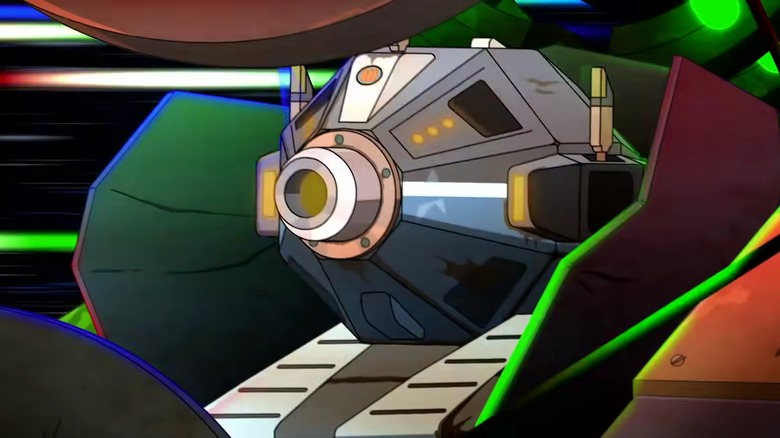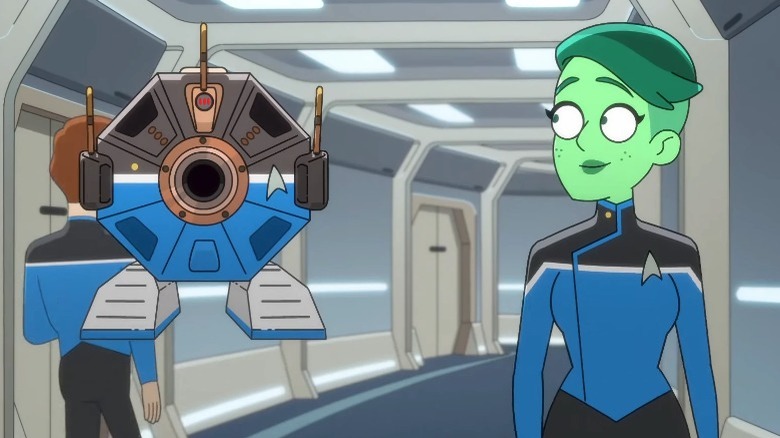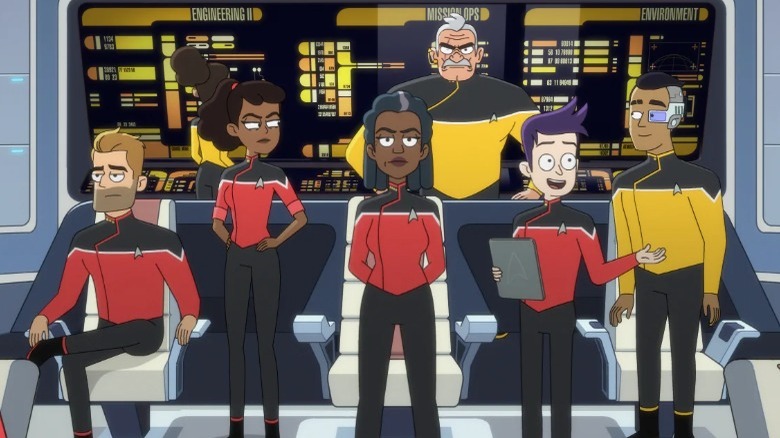Star Trek: Lower Decks Season 3 Takes Its Biggest Narrative Swing Yet — And It's A Nice Change Of Pace
The format break: it's as loathed as it is loved, if not more. Sometimes self-contained one-off episodes can be done brilliantly, as with the great (yet still polarizing) "Breaking Bad" outing "The Fly." Sometimes they're a mixed bag, as with the one-off obsessed third season of "Atlanta." And sometimes they get dragged to hell, like that time "Stranger Things" paused its climax for a heavily "The Warriors"-inspired interlude, or the much-loathed Nikki and Paolo episode of "Lost."
I've always been a fan of a format-breaking episode, so when my fellow Trek-loving co-workers and I started planning coverage for an episode of "Star Trek: Lower Decks" that they all said will surely divide fans, I had to wrack my brain to figure out what they were even talking about. Did a legacy character get slandered and I missed it? Did the Cerritos crew do something controversial? Nope, it turns out the mixed opinions were actually about the admittedly random focus of this week's episode. It's an interlude that leaves the show's main characters largely offscreen in favor of telling a story about Peanut Hamper (Kether Donohue), the irritating exocomp who abandoned the Cerritos crew in the season 1 finale.
An imperfect but refreshingly disconnected episode
As an episode of television, "A Mathematically Perfect Redemption" is just fine. It's a quasi-"Avatar" parody that also serves as a sort of guide to what Starfleet isn't all about. Donohue, one of the brilliantly funny stars of FX's anti-rom-com "You're the Worst," puts in an enjoyably obnoxious performance as a vapid utility robot. Peanut Hamper condescends to the avian race whose planet she crash lands on, only to fall in love with one of their feathery leaders.
Though its ending puts Peanut Hamper's villainy into focus when it's revealed that she was attempting to sell the planet's abandoned tech to scavengers, it's pretty mean-spirited along the way, as Peanut constantly belittles the bird-folks. In the end, though, "A Mathematically Perfect Redemption" does turn out to be a traditional Trek episode, in that its lesson is one of anti-imperialism: the "prissy little robot" gets put on a storage shelf, and her holier-than-thou attitude towards a culture she doesn't understand backfires when it turns out their ideas about their tech bringing about conflict are true.
This experiment with "Star Trek: Lower Decks" format may not have been perfect, but it's refreshing for a show that can sometimes feel like it's designed to replay the greatest hits of "Star Trek" mythology with a light comedic twist. Don't get me wrong, I love the series' slate of familiar guest stars and Second Contact missions that riff on "Trek" episodes past, but I also haven't seen every single "Star Trek" show out there, and until I catch up, some percentage of "Star Trek: Lower Decks" will always be lost on me.
It's always exciting to see Trek go off book
My less-than-encyclopedic Trek knowledge — which I'm sure is a trait plenty of other viewers share — means that plenty of episodes feel about as random to me as this one. A show built around Easter eggs and in-jokes will always leave some folks out by default, so episodes that give the prerequisites a rest are a welcome change of pace for me as a semi-casual Trek fan.
Plus, we can't all be the ideal Starfleet recruit. While I think Peanut Hamper is the absolute worst, I can't help but relate to her mocking admission at the top of the episode, that she would never "kill herself for a bunch of randos she met three hours ago." As a series, "Star Trek: Lower Decks" is at once an antidote to the more self-serious Trek shows and a vessel for unabashed love for all that has come before, but it's nice to occasionally see a story about the impulses that cause some to run in the exact opposite direction as the ethically upstanding heroes of Starfleet.
In fact, it's refreshing to see a mission-of-the-week show go off book like this in general. The world of "Star Trek" is an expansive, imaginative, and near-endless one, and the animation format is just as open to experimentation. If any show seems designed to take big swings, it's "Star Trek: Lower Deck." Am I saying we should see a second Peanut Hamper-centric episode? No, definitely not. But it's always fun to see a Trek series go somewhere the decades-old franchise has never gone before, forsaking traditional and expected stories in favor of something creative and unpredictable.


